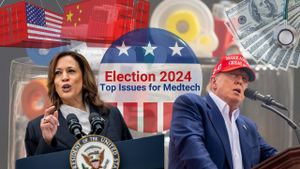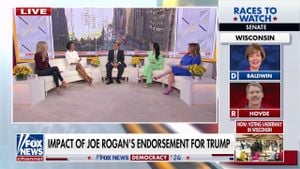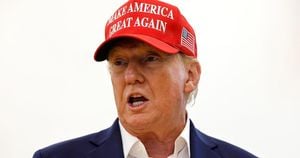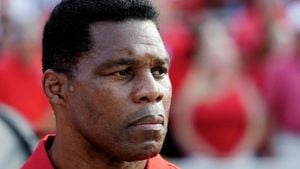On the eve of the 2024 United States presidential election, Elon Musk plunged headfirst back onto the political stage by promoting a video filled with QAnon references, significantly raising eyebrows just as millions of Americans prepared to vote.
The quirky clip, which would feel at home during any strange reality show, showcased snippets of former President Donald Trump intermixed with martial imagery and retro aesthetics reminiscent of 1980s video games and 1950s advertisement jingles. Musk, the world’s richest man, touted this bizarre tribute through his platform X, formerly known as Twitter, just before polls opened.
The video starts with the ominous tone of Trump, stating, “If you do something bad to us, we are going to do things things we’ve never done before.” This introductory sentiment quickly spirals as cheerful tunes from Van Halen's “Jump” backdrop the scenes of Americana interspersed with Trump’s rhetoric of “The future belongs to patriots,” as letters morphed on screen from “Patriots” to “PATRIQTS”—an obvious nod to the QAnon conspiracies enveloping the political atmosphere.
Interestingly, the video was crafted by the “National Revival” account, which has openly supported ideologies linking back to Nazi sentiments and anti-globalism. According to reports, this specific account has made statements praising Adolf Hitler and expressed disdain for modern political norms, so one could rightly suspect Musk's retweet tickled the edges of ethicality.
According to various commentators, this infiltration of conspiracy theories, particularly from Musk—who also shared QAnon-associated rumors about the dubious “Pizzagate” scandal earlier the same day—raises pressing questions about the nature of information being propagated on social media. Musk’s reach is vast; his posts have generated the equivalent visibility of expensive ad campaigns. A staggering 17 billion views on Musk’s posts since July paint the stark reality of how much influence he wields at this point.
It wouldn’t be entirely inaccurate to suggest Musk’s push for Trump reflects more than just personal support, but rather signifies how entrenched conspiracy ideologies have permeated mainstream political conversations. The fact Musk would engage with far-right content reinforces the notion of how readily political narratives intertwine with conspiratorial rhetoric.
For many, this behavior is nothing new. Musk has previously dipped his toes too far right and flirted with the edges of radical ideas, as highlighted by moments when he referenced QAnon cryptically without fully embracing the movement—though followers certainly take his nonchalance as validation.
It’s worth considering the motivation behind Musk’s enthusiasm for Trump’s campaign, especially after such vocal political endeavors. Just days before, Musk had endorsed innumerable narratives supporting once-disgraced figures and cementing his status among the champions for Trump, even appearing on popular platforms like Joe Rogan’s podcast where the billionaire made the case for his political hero. Social media mobs on both sides of the aisle erupted as news outlets and observers dissected what this fervent last-minute endorsement could mean for Trump, and if it would yield any significant impact on voters already casting ballots.
The chaotic stream of political videos and erratic endorsements raise questions. Will this glitzy, deranged montage alter the minds of the millions already engaged? Given early voting habits, many citizens have already made their selections and seem insistent on pushing back against late changes.
Notably, Musk’s promotion of this video and its underlying themes did not come without backlash. Some analysts and political experts pointed out how the unfavorable light raised suspicions on election integrity and the credibility of digital platforms when recklessly unleashed upon the unsuspecting public. The rise of misinformation became palpable as political strategists decried Musk’s complicity with extremist viewpoints.
Never one to turn down the spotlight, Musk attempted to facilitate his own “town hall” meeting via X, another play to drum up excitement for Trump’s campaign. The event faltered, delayed by technical issues, as Musk later decided to cancel it outright. It was symbolic of the chaotic energy surrounding Musk and his role as not just CEO of X but as a self-styled political influencer.
This election proves particularly defining for the United States as it continues to confront challenges ingrained within its fabric. Whether through the lens of Trump or Musk, the intersection of celebrity culture permeates politics, leading to immense consequences. The gravity of the situation is etched with concern as the digital world morphs the political sphere, and radicals find avenues to heighten their influence through celebrity endorsements, such as Musk’s.
The fabric of American democracy itself stands tested, with figures like Musk leveraging their platforms to amplify extremism just as they exploit the chaos and confusion of the electoral process. Mainstream political discourse could well become irreversibly altered with such intrusion, keeping the uncertainty about the future alive and perilous.
Such interplay should elicit more than just concern from traditional observers. Critical eyes need to oversee how this digital interaction shifts both the electorate and the political frameworks around them. Will it breed more acceptance of radical ideologies and unfounded conspiracy theories? Or, will voters stand resistant against being swept up by the fervent whirlpool of digital propaganda?
While Musk’s texts appear innocuous to some, the layers of meaning beneath them raise severe scrutiny. The viral reach of his sentiments, juxtaposed with the tantalizing pull of QAnon conspiracies, may transform political landscapes forever. The ultimate impacts remain speculative, yet one thing is clear: the crossroads of tech, celebrity influence, and politics is redefining the American voting experience, yielding potential ramifications both chaotic and grave.



